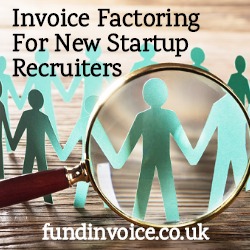- 01 Nov
Invoice Factoring For Recruitment Startups
 No sooner had I finished publishing our free business startup guide and we received an email from someone who is looking to launch a new startup recruitment company next year. The questions asked was as follows:
No sooner had I finished publishing our free business startup guide and we received an email from someone who is looking to launch a new startup recruitment company next year. The questions asked was as follows:“. . . would like to query whether we would be eligible for invoice factoring. I acknowledge that with a lack of a trading history, this may not be straightforward,”.
The alternative would be self-funding but that would be likely to significantly limit the growth rate of the business.
Invoice Factoring For New Startup Recruitment Companies
To answer that question, yes you would be eligible for invoice factoring, and contrary to your expectations it will be straightforward. Specifically, recruitment invoice finance which is tailored to serve the needs of recruiters and employment agencies.
However, not all factoring companies will fund new startups without a track record, but there are those that will - either funding all invoices or a selective facility for the invoices you choose.
Recruitment is also an ideal trade to access factoring. The debts tend to be straightforward, with timesheets signed for temporary staff that are used to evidence the debt. Many recruitment finance companies can also offer other subsidiary services, such as payroll management.
Invoice factoring combines the cash flow benefit of being paid immediately after you raise sales invoices, with a credit control service to collect your invoices. This can save the directors of a new startup company from having to undertake the credit control, or from having to pay for a credit controller.
Read more about finding a recruitment factoring company.
Business Loans And Their Limitations
Business loans are only really going to be an option once they have some trading history, or if they have other assets, such as property to offer as security. This is not required with invoice factoring as the invoices are the security, so this is one of the few sources of business funding for companies without other assets or trading history.
The other issue with a business loan is that it is for a fixed sum, whilst invoice factoring grows with your turnover. The more you invoice, the more funding is released. Bank overdrafts and loans do not work in this way.
- Home
- Business Financing
- Invoice Finance
- Invoice Discounting
- Factoring
- Debt Factoring
- Recourse Factoring
- Fund Selected Invoices
- Business Loans
- Construction Sector Funding
- Protect Against Bad Debts
- Exports Collection And Funding
- Import Funding
- Body Shop Funding
- Spot Factoring
- Retail Sector Funding
- Fund Invoices Confidentially
- Help Running Your Payroll
- CHOCs Customer Handles Own Collections
- Collect Invoices Confidentially And Funding
- Outsourcing Your Credit Control
- Asset Finance And Mortgages
- Case Studies
- About Us
- Testimonials
- Find Out More
- News
- Free Magazine
- Blog






